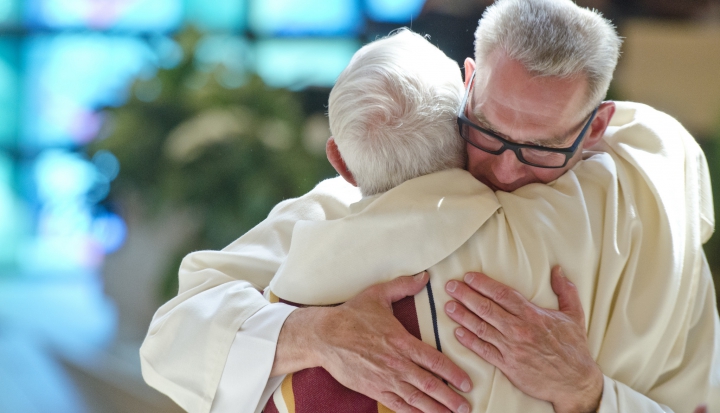A group of Catholic ministers gathered last Friday to reflect on the ongoing clergy abuse and cover-up crisis. The pain that some ordained men inflicted on their victims as well as the pain that a broken clerical system inflicts on the entire church community continue to baffle and disgust me.
St. Paul’s letter to the Hebrews, proclaimed this year for the second reading Sunday, November 4th and Sunday, October 28th, lays out the particular calling of priesthood. I think it’s a reminder that could really benefit the church today.
Paul doesn’t root priesthood in a call to be chief administrator, perfect pastor, or holiest gatekeeper. Instead, Paul writes that the role of a priest is to be a “representative” of human beings before God. The priest’s identity as representative is to “offer gifts and sacrifices for sins.”
But whose sin? Here’s where Paul’s description gets interesting. Paul tells the Hebrews that priests are to offer sacrifice day after day, “first for their own sins and then for those of the people.”
I think Paul’s point is a significant one: a duty of priestly ministry is to repent for personal sins.
Paul says that the reason priests are able to—and need to—sacrifice for the sins of humanity is because they themselves are “beset by weakness.” There is no hierarchy of holiness here. Paul writes, “Every high priest is taken from among humans.” The ordained are called by God as they are, broken and in need of mercy like everyone else, to offer gifts and sacrifices for sins to God on behalf of themselves and all of God’s people.
I wonder how much better off the church would be if we could find a consistent way to create safe space for all people, including priests, to be their authentic selves. No more pedestals, no more striving for perfection, no more cover-ups. Just fellow human beings trying and failing and trying again to grow in holiness together. It’s worth noting that creating safe space is one thing. Entering into it is another. Would all priests be willing to step into that vulnerable space? For those who already are more transparent with their congregations, what are the benefits and difficulties? Where do you let your authentic self show? In homilies? In parish council meetings?
A priest friend once told me how lonely he feels when parishioners put him on a pedestal. At the same time, he enjoys some of the privileges of being “Father.” The immediate respect and constant affirmations feel good. How would church life change if we understood priesthood as different from other vocations instead of better than? Every vocation brings unique gifts to the world. I think a wider acceptance of this reality would lessen clericalism and promote more honest repentance.
Paul’s images of priesthood help me imagine a church where all people—lay, ordained, and religious alike—can hold one another accountable for shortcomings, and do so out of a deep compassion for individuals and desire to see them heal. I imagine a church where everyone is more transparent about their brokenness so we can get help for bad behavior before it destroys lives and creates a culture of abuse and secrecy. I imagine a church that offers honest apologies, seeks true forgiveness, and works towards difficult reconciliation.
Maybe then the whole church could extend the grace of the confessional. Maybe then we could take steps towards healing this broken body.
Image: Flickr cc via Catholic Diocese of Saginaw














Add comment